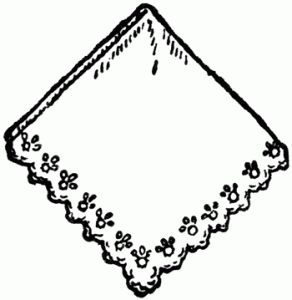At a time when such excesses were worthy of condemnation, something like the following line--a description of an order from the king's tailor, Walter Rauf--would surely make heads turn and eyes roll:
parvis peciis factis ad liberandum domino regi ad portandum in manu suo pro naso suo tergendo et mundando
"small pieces made for giving to the lord king to carry in his hand for wiping and cleaning his nose"
Why does this stand out?
Prior to this, the sleeve was the primary receptacle for the things for which we now use handkerchiefs or tissues. Stella Mary Newton, in her Fashion in the Age of the Black Prince, does not find any evidence of handkerchief use in the courts of Europe. This seems to counter the theory that Richard picked up this "foppish" practice from France.* We know the Romans used a piece of cloth called a sudarium for wiping sweat, but that is not likely where Richard got the idea, since there is no evidence that the sudarium survived as a custom in Europe. So maybe Richard did invent the pocket handkerchief.
For more details, see Margaret Roe Designs, who also covers the Roman use of the sudarium.
*Richard was raised in France, where his father, Edward the Black Prince, held much land thanks to Edward III's successes in the Hundred Years War. In fact, it's pretty certain that Richard never bothered to learn English.
